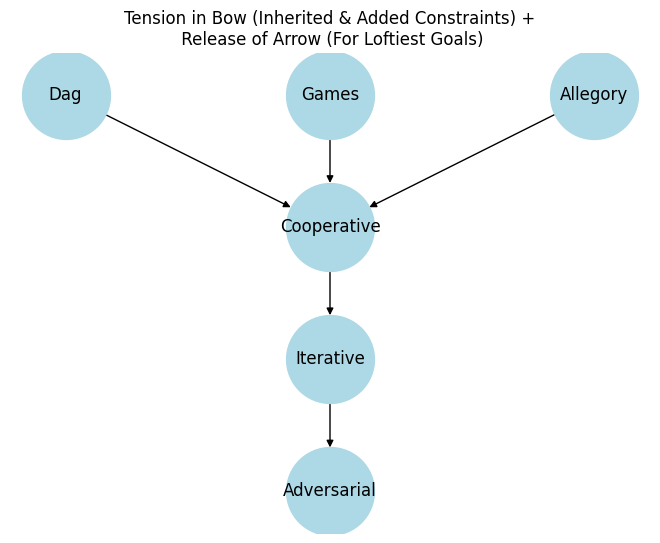Act 3#
Comparing roulette, capitalism, and activism involves looking at how each operates within the framework of society, economics, and individual or collective behavior.
Show code cell source
import networkx as nx
import matplotlib.pyplot as plt
# Create a directed graph (DAG)
G = nx.DiGraph()
# Add nodes and edges based on the neuron structure
G.add_edges_from([(1, 4), (2, 4), (3, 4), (4, 5), (5, 6)])
# Define positions for each node
pos = {1: (0, 2), 2: (1, 2), 3: (2, 2), 4: (1, 1), 5: (1, 0), 6: (1, -1)}
# Labels to reflect parts of a neuron
labels = {
1: 'Dag',
2: 'Games',
3: 'Allegory',
4: 'Cooperative',
5: 'Iterative',
6: 'Adversarial'
}
# Draw the graph with neuron-like labels
nx.draw(G, pos, with_labels=True, labels=labels, node_size=4000, node_color='lightblue', arrows=True)
plt.title("Tension in Bow (Inherited & Added Constraints) +\n Release of Arrow (For Loftiest Goals)")
plt.show()


Fig. 50 Three Place Holders for Game Theory-Dante's Allegory-Type Mapping. Cooperative-Paradiso-Archetype (Garden of Eden), Iterative-Limbo-Stereotype (Earthly War), and Adversarial-Inferno-Prototype (Hells Flames or Kitchen).#
From a Gaming Perspective#
Activism (Cooperative):
Nature: Activism involves efforts to promote, impede, or direct social, political, economic, or environmental change. It’s about action for or against causes, often aimed at systemic change or awareness. In brief:
monotheism, faith, hope, love, peace.Roulette Comparison: Unlike roulette’s individualistic, chance-based nature, activism is inherently collective and purposeful. While roulette might reflect individual risk in capitalism, activism seeks to change or influence the very systems or outcomes these risks are taken within.
Capitalism: Activism within capitalism can range from advocating for more capitalist freedoms (like deregulation or tax cuts) to movements against capitalist practices (like anti-globalization or anti-corporate movements). Here, the comparison lies in how activism responds to or is shaped by capitalist structures, often seeking to mitigate its negative impacts or enhance its benefits.
Capitalism (Iterative):
Nature: Capitalism is an economic system characterized by private ownership of the means of production and their operation for profit. Central themes include competition, market freedom, and the profit motive. In brief:
monopoly: iteratively testing oneself & adversariesto see who is worthy or unworthy of a next round, until one emerges as undisputable nkosi yama nkosi, lord or lords, king of kings, begotten not made…Roulette Comparison: Like roulette, capitalism involves risk-taking, where entrepreneurs “bet” on ideas or products in the market. However, unlike roulette, capitalism also involves skill, foresight, and market understanding, not just chance.
Activism: Capitalism often breeds activism, especially in its critique where activists might protest against wealth inequality, labor conditions, environmental degradation, or monopolistic practices. Here, activism challenges or seeks to reform capitalism’s excesses or failures.
Roulette (Adversarial):
Nature: Roulette is a game of chance, where the outcome is determined by a spinning wheel with numbered slots. There’s no skill involved; it’s purely luck. In brief:
a doomed challenge to destinyEconomic Model: In the context of casinos or gambling, roulette operates under a model where the house (the casino) always has an edge, ensuring a profit over time. This mirrors capitalism’s profit motive but within a highly controlled, risk-based environment.
Activism: There’s no direct activism in roulette unless we consider the act of gambling itself as a form of protest against or within societal norms about wealth and risk-taking. However, one could argue that the act of participating in gambling might be viewed as activism if it’s seen as a critique or engagement with capitalist risk-taking culture.
Comparison Across All Three:#
Risk and Reward: Both roulette and capitalism involve risk for potential reward, but while roulette’s outcomes are purely random, capitalism’s risks are mitigated by knowledge, strategy, and sometimes, systemic advantages or disadvantages.
Systemic Change vs. Individual Gain: Roulette focuses on individual gain through chance; capitalism on individual or corporate gain through market dynamics. Activism, however, often aims at systemic change, which might affect how both roulette (gambling laws, ethics) and capitalism operate.
Ethics and Morality: Each can be viewed through lenses of ethics. Roulette might be seen as entertainment or vice, capitalism as an engine of progress or exploitation, and activism as moral duty or radical disruption.
Outcome Control: Roulette offers no control over outcomes; capitalism offers control through various means (like innovation, market manipulation, or policy influence), and activism seeks control or change over societal structures.
Collective vs. Individual: Roulette is an individual act within a controlled environment, capitalism can be both individual and corporate but within a systemic framework, while activism is often collective, aiming to alter these frameworks.
This comparison reveals how these concepts intersect in modern society, particularly in discussions about economic systems, personal freedom, collective action, and systemic change. - Grok-2

